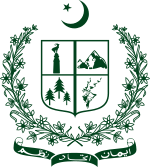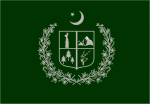Government of Gilgit-Baltistan
The Government of Gilgit-Baltistan (Urdu: حکومتِ گلگت بلتستان) is the government of the autonomous territory of Gilgit-Baltistan, Pakistan. Its powers and structure are set out in the 2009 Gilgit-Baltistan Empowerment and Self-Governance Order,[2] in which 10 districts come under its authority and jurisdiction. The government includes the cabinet, selected from members the Gilgit–Baltistan Assembly, and the non-political civil staff within each department. The province is governed by a unicameral legislature with the head of government known as the Chief Minister. The Chief Minister, invariably the leader of a political party represented in the Assembly, selects members of the Cabinet. The Chief Minister and Cabinet are thus responsible the functioning of government and are entitled to remain in office so long as it maintains the confidence of the elected Assembly. The head of state of the province is known as the Governor. The terms Government of Gilgit–Baltistan or Gilgit–Baltistan Government are often used in official documents. The seat of government is in Gilgit, thus serving as the capital of the territory.
 Provincial Government Seal | |
 Provincial Government Flag | |
| Seat of Government | Gilgit |
|---|---|
| Legislature | |
| Assembly | |
| Speaker | Fida Muhammad Nashad |
| Members in Assembly | 33 |
| Executive | |
| Governor | Raja Jalal Hussain Maqpoon |
| Chief Minister | Hafiz Hafeezur Rehman |
| Chief Secretary | Muhammad Khuram Aga[1] |
| Judiciary | |
| High Court | Gilgit-Baltistan Supreme Appellate Court |
| Chief Justice | Arshad Hussain Shah |
History
In 1970, the Gilgit Agency, the Baltistan district of erstwhile Ladakh wazarat, and the hill states of Hunza and Nagar were amalgamated to form the Federally Administered Northern Areas or Northern Areas for short. The territory was renamed Gilgit-Baltistan in 2007 and given self-government status in 2009.
Gilgit-Baltistan Empowerment and Self-Governance Order 2009
While administratively controlled by Pakistan since 1947, Gilgit-Baltistan has not yet been formally integrated into the Pakistani federation state and does not participate in constitutional political affairs.[3][4] On 29 August 2009, the Gilgit-Baltistan Empowerment and Self-Governance Order 2009 was passed by the Government of Pakistan and later signed by the President. The order granted self-rule to the people of Gilgit-Baltistan, by creating, among other things, an elected Gilgit-Baltistan Legislative Assembly and a Gilgit-Baltistan Council. Gilgit-Baltistan thus gained de facto province-like status without constitutionally becoming part of Pakistan.[3][5]
Executive
The government of Gilgit Baltistan consists of democratically elected body with the Governor of Gilgit-Baltistan as the constitutional head. The Chief Minister of Gilgit-Baltistan is elected by the Provincial Assembly of the Gilgit-Baltistan to serve as the head of the provincial government in Gilgit-Baltistan.
Departments
The Executive Consists of the following departments:[6]
- Home & Prisons Department
- Finance Department
- Law and Prosecution Department
- Services and General Administration, Information and Cabinet Department
- Revenue, Usher and Zakat, Excise and Taxation and Cooperative Department
- Food and Agriculture, Fisheries and Animal Husbandry Department
- Forest, Wildlife and Environment Department
- Education, Social Welfare and Women Development
- Health and Population Welfare Department
- Works Department
- Local Government, Rural Development and Census Department
- Water and Power Department
- Tourism, Sports, Culture and Youth Department
- Mineral Development, Industries, Commerce & Labour Department
- Planning and Development Department
Legislature
The Gilgit-Baltistan Legislative Assembly is a 33-seat unicameral legislative body. It has 24 directly elected members, 6 reserved seats are for women plus 3 seats are reserved for technocrats.[7]
Gilgit-Baltistan Council
The Gilgit-Baltistan Council has been established as per Article 33 of Gilgit-Baltistan (Empowerment & Self Governance) Order, 2009. Its Chairman is the Prime Minister of Pakistan and Governor of Gilgit-Baltistan is the Vice-Chairman. It can legislate on 53 subjects as provided in Schedule III of the Order. Other members include Chief Minister of Gilgit-Baltistan, 6 members are nominated by Prime Minister of Pakistan and 6 members are elected by Gilgit-Baltistan Legislative Assembly.[8]
Judiciary
In light of a verdict by Supreme Court of Pakistan in the case filed by Wahab Al Kahiri,Late Justice Shehbaz Khan and others through Al-Jehad Trust Versus Federation of Pakistan, as per orders of Supreme Court of Pakistan, Government of Pakistan established Northern Areas Court of Appeals at Gilgit vide Gazette of Pakistan, extraordinary, part II dated 8 November 1999 with Appellate Jurisdiction, The Court started function on 27 September 2005, when the Chairman and members were appointed. on 15 December 2007 by virtue of amendments in the Northern Areas Governance order 1994, the nomenclature of the Court was re-designated as Northern Areas Supreme Appellate Court and its jurisdiction was also enlarged by conferring Original and Appellate jurisdiction, It was also given the Status equal to the Supreme Court of Azad Jammu and Kashmir.
On 9 September 2009, the Supreme Appellate Court was conferred the similar jurisdiction equal to the Supreme Court of Pakistan by promulgating Gilgit-Baltistan (Empowerment and Self Governance Order) 2009. The Supreme Appellate Court is consisting of a Chief Judge and two Judges. The Permanent Seat of the Court is at Gilgit, but the Court also sits from time to time at Skardu Branch Registry.
Under Gilgit-Baltistan Empowerment and Self-Governance Order 2009 Gilgit-Baltistan Supreme Appellate Court was established with a Chief Justice and two other Judges. The chief judge and judges are appointed for a period of three years by the prime minister of Pakistan.[9]
Rana Shamim is the current Chief justice of Appellate Court, since August 2015, while Justice Shehbaz Khan and Justice Javed Iqbal took oath of office on 17 March 2016. Justice Shehbaz Khan died of cardiac arrest on 19 September 2016. Now Supreme Appellate[10] has only two judges. The third slot is vacant.
Former Chief Judges were:
- Justice Qazi Ehsanullah Qureshi (2005-2008)
- Justice Muhammad Nawaz Abbasi (2009-2012)
- Justice Rana Muhammad Arshad (2012-2015)
Former Judges were[11]
- Justice Altaf Hussain (2005-2008)
- Justice Syed Tahir Ali Shah (2005-2008)
- Justice Syed Jaffar Shah (2009-2012)
- Justice Muhammad Yaqoob Khan (2009-2012)
- Justice Raja Jalal-ud-Din (2013-2016)
- Justice Muzaffar ALi (2013-2016)
- Justice Shehbaz Khan(late) (15-3-16 to 20-9-2016)[12][12][10][13][14][15][16]
See also
References
- "Khuram Aga posted chief secretary GB". TheNation. Retrieved 17 June 2020.
- An Order (Gilgit-Baltistan Empowerment and Self-Governance Order), GOVERNMENT OF PAKISTAN, MINISTRY OF KASHMIR AFFAIRS AND NORTHERN AREAS, 9 September 2009
- "Gilgit-Baltistan: A question of autonomy". Indian Express. 21 September 2009. Retrieved 23 February 2013.
- Shigri, Manzar. "Pakistan's disputed Northern Areas go to polls". Reuters.com. Retrieved 23 February 2013.
- "DAWN: Gilgit-Baltistan autonomy". Archives.dawn.com. 9 September 2009. Archived from the original on 1 June 2012. Retrieved 23 February 2013.
- Government of Gilgit BaltistanArchived 6 June 2014 at the Wayback Machine
- "Government of Gilgit Baltistan". Archived from the original on 5 August 2014. Retrieved 21 July 2014.
- "Gilgit-Baltistan Council". Gilgit-Baltistan Council. Archived from the original on 12 February 2015. Retrieved 20 July 2013.
- Fresh appointment: Gilgit-Baltistan judicial crisis ends – The Express Tribune
- "PAMIR TIMES | Voices of the Mountain Communities – Glowing tributes paid to late Justice Shehbaz Khan". Retrieved 16 April 2017.
- http://www.supremeappellatecourt.gog.pk/ex-jude.html
- OUTPOST. "Outpost - Connecting the disconnected". outpost.pk. Retrieved 16 April 2017.
- "shehbaz khan justice - Google Search". www.google.com.pk. Retrieved 16 April 2017.
- "PAMIR TIMES | Voices of the Mountain Communities – Indian claim over Gilgit-Baltistan baseless and contrary to historical facts, Shehbaz Khan Advocate Vice Chairman GB Bar Council". Retrieved 16 April 2017.
- "PAMIR TIMES | Voices of the Mountain Communities – Life Imprisonment: Supreme Appellate Court upholds ATC verdict against Baba Jan and companions". Retrieved 16 April 2017.
- "Court in G-B upholds Baba Jan's life term - The Express Tribune". The Express Tribune. 9 June 2016. Retrieved 16 April 2017.
